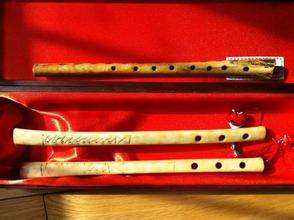Tajik eagle flute playing method
376 views · Organized by 青鸟 on 2022-02-09
The Tajik eagle flute is named after the eagle's wing bones. In Tashkorgan, where the Tajik people live, you will hear the fascinating sound of the eagle flute whether you are walking in a mountain village or on a grassy pasture.

Involving musical instruments
Eagle flute (pinyin: yīng dí), named after the eagle’s wing bones, is also known as bone flute, eagle bone flute, or jerk. There are two kinds of eagle flutes, one is Tibetan eagle flute, and the other is Tajik eagle flute, which is often used for solo.
Guess you like
Organized by 某某 on 2022-02-09
The Tajik eagle flute is named after the eagle's wing bones. In Taxkorgan, where the Tajik people live, you will hear the fascinating sound of the eagle flute whether you are walking in the mountain village or on the grassy pasture.
read >>
 渝公网安备 50010702504639号
渝公网安备 50010702504639号